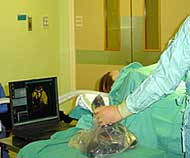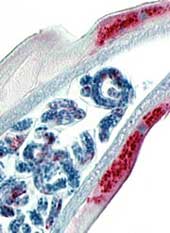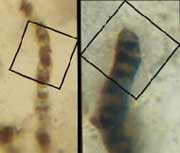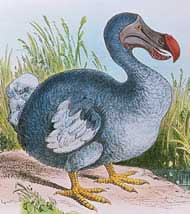Researchers at UCLA Health have discerned four unique routes that contribute to the onset of Alzheimer’s disease through the analysis of electronic health records, providing novel insights into the progressive nature of the disorder rather than attributing it solely to individual risk factors. The research, published in eBioMedicine, analysed longitudinal health data from over 25,000 patients in the University of California Health Data Warehouse and corroborated findings in the nationally diversified All of Us Research Program. In contrast to earlier…

An inventive breakthrough from the Applied Optics Group at the University of Kent at Canterbury (UKC) is set to revolutionise current methods of eye examinations.
Professor David Jackson, Dr Adrian Podoleanu and Dr John Rogers, who gained his doctorate at Kent, have developed an instrument known as an Optical Dual Channel Tomograph. The instrument blends together two imaging technologies. Although in its early stages, it is already being used by ophthalmologists and researchers at New York`

The tobacco industry has deliberately deceived the public with “low tar/light” cigarettes, reveals an analysis in a special supplement to Tobacco Control. Industry documents show that companies recognised that low tar products were as dangerous as regular cigarettes, yet marketed them as healthy alternatives.
The authors analysed trade sources and internal US tobacco company documents. These show that the industry feared mounting evidence linking tobacco with lung cancer would discourage smo

Virtual organ image beamed into OR.
Liver surgeon Rory McCloy carries a wad of CAT scans into his operations. “I spend my life looking at 60 slices of salami,” he says. Peering at the light-box, he constructs a mental picture of a tumour before making a cut. “I’m trying to do a 3D operation with 2D images,” he protests.
Despite the wide availability of 3D graphics programs, they rarely penetrate operating theatres. Frustrated by the technology void, McCloy, of Manchester Roy

A robot submarine expedition under the Antarctic sea ice has discovered a major food reserve in the Southern Ocean. The findings, reported this week in SCIENCE, show a dense band of the shrimp-like krill under the ice, five times more concentrated than in open water. The importance of sea ice as a nursery for krill – key food for penguins, whales and fish – has long been suspected, but these are the first large scale measurements.
Scientists from the British Antarctic Survey, the Open Univer

A molecular pump that helps to keep cells flush with energy has been visualised by scientists at Imperial College, London.
The structure of the pump, a key enzyme in bacterial respiration, reveals for the first time one of the molecular mechanisms that underpins cellular respiration, and confirms a Nobel Prize-winning theory proposed over 40 years ago by Briton Peter Mitchell.
Professor So Iwata and colleagues from the Laboratory of Membrane Protein Crystallography, Imperial Colleg

A team of chemists and physicists at the Universities of Liverpool and Oxford have shown that hydrogen transmits magnetism. This discovery could be the first step to a new class of magnetic materials, and opens up a new field of chemistry.
The team, headed by Professor Matthew Rosseinsky of the Department of Chemistry, University of Liverpool, and including Dr Stephen Blundell of the University of Oxford, has prepared a new magnetic oxide material in which for the first time the dominant ma

Most smokers are disenchanted with smoking and would not smoke if they had their time again, according to a letter in this week’s BMJ. It also shows that smokers’ expectations of how soon they will quit greatly exceed rates of quitting observed in recent history.
A national sample of 893 smokers were asked: “If you had your time again would you start smoking?” Over 80% said that they would not (79% men, 87% women). Those aged 45 to 64 were most regretful, with 90% saying that they would not

Patients on new Angina Plan report 40% reduction in angina attacks per week New research published in the British Journal of General Practice revealed that patients on the York Angina Plan, compared to those receiving a conventional educational session, reported a 40% reduction in the number of episodes of angina per week (a reduction of three from the baseline mean of seven attacks). This was despite the fact that they were more active. They also showed a lower level of anxiety and d

Microbes, not the worms that carry them, aggravate the immune system.
Stowaway bacteria inside parasitic worms, and not the worms themselves, cause river blindness, according to new research. The finding could lead to better ways of preventing or treating the debilitating disease.
River blindness, or onchocerciasis, affects some 17 million people throughout central Africa and in parts of Arabia and South America. Sufferers develop inflammatory conditions. When inflammation

Early humans came out of Africa again and again.
There were at least three major waves of early human migration out of Africa, our DNA suggests. Apparently the wanderers made love, not war: gene patterns hint that later emigrants bred with residents.
Human origins are contentious. Most researchers agree that there have been several major migrations out of Africa. Some hold that human populations in many regions evolved in parallel after Homo erectus left Africa around two mi

Gloves are coming off in ancient bacteria bust-up.
A claim to have found evidence of the oldest living things on Earth is being fiercely contested. The argument looks set to run and run, and no one may win, but it may lead to a better understanding of the origins of life on our planet.
The debate is academic, but its implications are not. The ’fossil bacteria’ in question are around 3.5 billion years old. That’s roughly one billion years older than the only confirmed fossil

Salt is critical to the brain development of premature babies, suggests research in the Fetal and Neonatal Edition. Language, memory, intelligence and coordination were all better in children, who had been born premature but whose diets had been supplemented with salt shortly after birth.
The study focused on 37 children who had been monitored since birth. All had been born before or at 33 weeks of pregnancy. Between the ages of 10 and 13 the children were tested for competency in movement a

Spondyloarthropathies are rheumatic infectious diseases affecting the spinal column and peripheral joints and tendons. These diseases either occur as such (Bechterew`s disease or ankylosing spondylitis), or are combined with skin psoriasis, inflammatory intestinal diseases (Crohn`s disease and ulcerating colitis), and eye infection (uveitis).
These diseases effect about 1% of total world population and often develop into seriously debilitating conditions with complete stiffening of the spin

Under the agreement, the two companies will work to develop affinity-based products for use in the production processes for protein-based pharmaceuticals. The development of these products will be based on Affibodies™, a novel class of small, robust affinity proteins designed to bind desired protein targets. Financial details of the agreement were not disclosed.
“The use of Affibodies™ opens up new possibilities for large-scale protein purification for production of protein based pharmaceuti

A team including scientists at UCMP (Umeå Center for Molecular Pathogenesis), a research unit at Umeå University, shows in last week’s issue of the journal Science that the protein PGRP-LC plays a crucial role in so-called innate immunity.
Professor Dan Hultmark, post-doctoral fellow Svenja Stöven, and doctoral candidate Thomas Werner at UCMP are focusing their attention on the mechanisms behind natural, or innate, immunity, and they are using the fruit-fly, Drosophila melanogaster, as a mod

Ancestors of the flightless figurehead of extinction island-hopped.
The flightless dodo’s ungainly shape hid an island-hopping past, say researchers. DNA from the extinct bird has revealed its place in the pigeon family tree, and suggests how it came to end up on its home, and graveyard, the island of Mauritius 1 .
The dodo’s strange appearance led to centuries of wrangling over its ancestry. “It’s the figurehead of extinction, yet little is known about its e